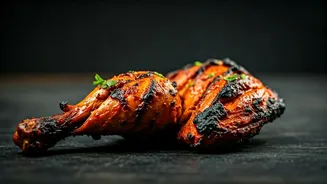Ancient Roots, Modern Appeal
The North-West Frontier cuisine, also known as Pashtun food, has its origins deep within the historical and geographical context of the borderlands between
Afghanistan and Pakistan. It was heavily influenced by its position along the Silk Route, acting as a melting pot of flavors and cooking styles from various regions, including Central Asia, Afghanistan, and the Middle East. Persian techniques from the Achaemenid Empire also influenced the cuisine. This fusion of influences, coupled with simple cooking methods, gave rise to a style that’s simultaneously rustic and refined, deeply connected to its history. The cuisine's essence, marked by the use of yogurt, layered spices, and communal dining, continues to resonate today, proving that old culinary practices can find new relevance.
Core Characteristics
Chef Ajit Bangera identifies five key elements that distinguish this cuisine. Firstly, the use of minimal marinades focuses on enhancing the ingredient's natural flavors through a few carefully selected spices. Second, hearty and slow-cooked meats are a staple, ensuring tenderness and depth of taste. Thirdly, the art of the tandoor is central to achieving that unmistakable char and smoky flavor that characterizes the cuisine. Fourth, the communal dining tradition strengthens the bonds of togetherness, emphasizing shared experiences. Lastly, the flavor profile is balanced: black pepper, cumin, and fresh masalas work to enrich the dishes. These principles, rooted in the traditions of the frontier, continue to shape the modern interpretations of this cuisine.
Simplicity & Patience
At the heart of North-West Frontier cuisine is a commitment to simplicity and patience. Ingredients are handled with care, marinated slowly, and cooked over open flames to draw out their true character. The chefs maintain that the smoky essence of the tandoor, the depth of the hand-ground masalas, and the tenderness of slow-cooked dishes are the elements that produce food that feels both substantial and regal. These elements create a unique character for the dishes and make them unforgettable. This cuisine relies on an understanding that the most profound flavors are often produced not through complication, but through the careful handling of ingredients and the dedication to time-honored cooking techniques. This simple approach emphasizes the flavor of ingredients and adds to the depth of the dishes.
The Modern Adaptation
North-West Frontier cuisine is more than just a collection of recipes; it's a living tradition that continues to evolve. Chefs have adapted the cuisine for the modern palate while preserving its fundamental essence. These modern chefs are experimenting with new presentation and texture while retaining the original character. These modern adaptations are an indication of how this cuisine has managed to stay relevant and popular in India. The cuisine showcases the ability to stay true to its traditions while adapting to changing tastes. The ongoing evolution is proof of this cuisine's dynamism, ensuring its place in the culinary world.
Culinary Poetry
Dishes retain their signature tandoor smokiness and robust textures but are presented with refined modern flair. This transformation in presentation, while the core of the cuisine remains untouched, is also a journey back to its origins. The slow-cooked meats, soulful dals, and bread baked in clay ovens are culinary poetry, unhurried and honest. The result is food that speaks not through complexity, but through authenticity. The personal touches passed down through generations are what add to the uniqueness of the cuisine. This cuisine, born in the rugged frontier lands, celebrates simplicity and time. The smoky aroma of the tandoor, the richness of hand-ground masalas, and the tenderness from slow cooking together create food that feels both hearty and royal.
A Legacy's Impact
Chef Yugal Sharma reflects on the magic and legacy of this cuisine, emphasizing that it exists not only in kitchens but also in memories. The deep-seated legacy of the cuisine, with its focus on patience and respect for the ingredients, flame, and craft, has left an indelible mark on the Indian culinary landscape. This legacy is proof of the enduring appeal of North-West Frontier cuisine, where the love of honest food cooked on fire is still celebrated. From the use of yogurt and spices in marinades to the communal dining tradition, the essence of the cuisine continues to captivate, ensuring that the flavors of the frontier will continue to endure, just as they have for centuries.



















